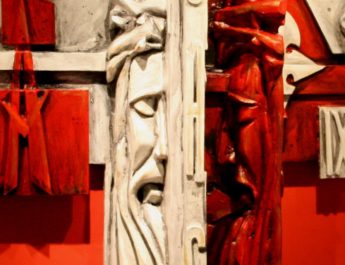Matthew 11:2-11
Third Sunday of Advent A
2 When JohnA heardB in prisonC
A “John” = Ioannes. From Hebrew yochanan (Johanan); from Yehochanan (“the Lord has been gracious”); {from YHVH (proper name of the God of Israel); {from havah (to become); from hayah (to be, exist, happen)} + chanan (beseech, show favor, be gracious; properly, to bend in kindness to someone with less status). This is John, meaning “the Lord has been gracious.”
B “heard” = akouo. This is hear or listen, but it also means to understand by hearing. This is where the word “acoustics” comes from.
C “prison” = desmoterion. 4x in NT. From desmos (a bond, chain, infirmity, impediment, ligament); from deo (to tie, bind, fasten, impel, compel; to declare something against the law or prohibited). This is a prison or dungeon.
what the MessiahD was doing,E he sentF word by his disciplesG
D “Messiah” = Christos. From chrio (consecrate by anointing with oil; often done for prophets, priests, or kings). Literally, the anointed one, Christ. The Greek word for Messiah.
E “what…doing” = ergon. From ergo (to work, accomplish, do). This is work, task, deed, labor, effort.
F “sent” = pempo. This is to send, put forth, or dispatch. This often refers to a temporary errand. It is sending someone with a focus on the place they departed from. By contrast, another Greek word, hiemi, emphasizes the destination and yet another word, stello, focuses on the motion that goes with the sending.
G “disciples” = mathetes. From matheteuo (to make a disciple of); from manthano (to learn key facts, gain knowledge from experience; generally implies reflection as part of the learning process); from math– (thinking things through). This is a disciple, learner, or student. It is where we get “mathematics” from.
3 and said to him, “Are you the one who is to come,H or are we to wait forI another?”J
H “come” = erchomai. This is to come or go.
I “wait for” = prosdokao. 16x in NT. From pros (at, to, toward, with) + dokeuo (to watch). This is to await, anticipate, expect, look for.
J “another” = heteros. This is other, another, different, strange. It is another of a different kind in contrast to the Greek word allos, which is another of the same kind. This could be a different quality, type, or group.
4 JesusK answered them, “GoL and tellM John what you hear and see:N
K “Jesus” = Iesous. Related to “John” in v2. From Hebrew Yehoshua (Joshua, the Lord is salvation); {from YHVH (see note A above) + yasha (to deliver, defend, help, preserve, rescue; properly, to be open, wide or free, which implies being safe. So, in a causative sense, this is to free someone)}. This is Jesus or Joshua in Greek – the Lord saves or the Lord is salvation.
L “go” = poreuomai. From poros (ford, passageway). This is to go, travel, journey, or die. It refers to transporting things from one place to another and focuses on the personal significance of the destination.
M “tell” = apaggello. From apo (from, away from) + aggello (to announce, report); {from aggelos (angel, messenger); probably from ago (to lead, bring, carry, guide, drive)}. This is to report, declare, bring word. It is an announcement that emphasizes the source.
N “see” = blepo. This is literally to see – it is primarily used in the physical sense. However, figuratively it can be seeing, which includes attention and so to watchfulness, being observant, perceiving, and acting on the visual information. It can also mean beware.
5 the blindO receive their sight,P the lameQ walk,R
O “blind” = tuphlos. Derivation unclear. Perhaps from tuphoo (to be conceited, foolish, puffed up, haughty; properly, to blow smoke; figuratively being muddled or cloudy in mind; poor judgment that harms spiritual clarity; also, being covered with smoke – so filled with pride); from tuphos (smoke, vanity, arrogance); from tupho (to raise smoke, smolder, slowly consume without flame). This is blind or a blind person – perhaps in the sense of smoke making things opaque and impossible to see. This is blind literally or figuratively.
P “receive…sight” = anablepo. Related to “see” in v4. From ana (up, back, again, among, between, anew) + blepo (see note N above). This is to look up or regain sight.
Q “lame” = cholos. 14x in NT. This is lame or limping. It can also mean missing a foot.
R “walk” = peripateo. From peri (about, concerning, around, encompassing) + pateo (to read, trample on; to trample literally or figuratively); {from patos (trodden) OR from paio (to strike, smite, sting; a hit like a single blow)}. This is to walk. Going from Hebrew figurative language, to walk referred to how you conducted your life, how you chose to live. This word is most literally walking around. Figuratively, it is living, behaving, following, how you occupy yourself. This is where “peripatetic” comes from.
those with a skin diseaseS are cleansed,T the deafU hear,
S “those with a skin disease” = lepros. 9x in NT. From lepis (fish scale, skin flake); from lepo (to peel). This is scaly or leprous. It can also refer to a person with leprosy.
T “cleansed” = katharizo. From katharos (clean, clear, pure, unstained; clean in a literal, ritual, or spiritual sense; so, also guiltless, innocent or upright; something that is pure because it has been separated from the negative substance or aspect; spiritually clean because of God’s act of purifying). This is to cleanse, make clean, purify, purge, or declare to be clean. Like its roots, it includes cleansing in a literal, ritual, or spiritual sense. Being pure or purified is not something that is only available to the rare few or the innocent. Anyone can be purified.
U “deaf” = kophos. 14x in NT. Perhaps from kopto (to cut, strike, cut off; beating the chest to lament and so to mourn). This is literally blunted or dull. Figuratively, it can be deaf or mute or a person who is deaf or mute.
the deadV are raised,W and the poorX have good news broughtY to them. 6 And blessedZ is anyone who takes no offenseAA at me.”
V “dead” = nekros. Perhaps from nekus (corpse). This is dead or lifeless, mortal, corpse. It can also be used figuratively for powerless or ineffective. It is where the word “necrotic” comes from.
W “raised” = egeiro. This is to awake, raise up or lift up. It can be to get up from sitting or lying down, to get up from sleeping, to rise from a disease or from death. Figuratively, it can be rising from inactivity or from ruins.
X “poor” = ptochos. From ptosso (to crouch or cower as a beggar does). This is poor or destitute – someone who is extremely poor and bowed down because of a long struggle under poverty. Properly, it means bent over so figuratively it is someone who is deeply destitute and lacking tangible resources. This is a beggar – as extremely opposite a wealthy person as possible.
Y “have good news brought” = euaggelizo. Related to “tell” in v4. From eu (well, good, rightly) + aggelos (see note M above). This is evangelize – literally to preach the good news. It can be those who hear the news, the news, or a way to say gospel.
Z “blessed” = makarios. From makar (happy); from mak– (to become long or large). This is blessed, happy, fortunate. It is when God’s grace/abundance is extended.
AA “take…offense” = skandalizo. From skandalon (the bait or portion of the trap that closes down on the victim – the trap’s trigger; a stumbling block, offense, or cause for error; something that sets into motion a negative cause and effect; something that causes one to stumble); perhaps from kampto (to bend or bow). This is to put a stumbling block in someone’s way. Figuratively, causing someone to sin or preventing them from good action. It can also mean to shock or offend. Literally, this is falling into a trap or tripping someone up. So, here, enticing someone to sin or apostasy.
7 As they went away,BB Jesus beganCC to speak to the crowdsDD about John: “What did you go outEE into the wildernessFF
BB “went away” = poreuomai. Same as “go” in v4. See note L above.
CC “began” = archomai. From archo (to rule, begin, have first rank or have political power). This is to begin or rule.
DD “crowds” = ochlos. Perhaps from echo (to have, hold, possess). This is a crowd, the common people, a rabble. Figuratively, it can refer to a riot.
EE “go out” = exerchomai. Related to “come” in v3. From ek (from, from out of) + erchomai (see note H above). This is to go out, depart, escape, proceed from, spread news abroad.
FF “wilderness” = eremos. Properly, a place that is not settled or farmed, not populated. It could be a deserted area or a desert place. It could be seen as secluded, solitary, or lonesome. Any kind of vegetation is sparse, but so are people generally.
to look at?GG A reedHH shakenII by the wind?JJ
GG “look at” = theaomai. From thaomai (to gaze at a spectacle; to look at or contemplate as a spectator; to interpret something in efforts to grasp its significance). This is to behold, look upon, see, contemplate, visit like a spectator. This is the root of the word “theatre.”
HH “reed” = kalamos. 12x in NT. This is a reed, whether the plant itself or a stem that is like the reed. It can also imply a staff, pen, or measuring rod.
II “shaken” = saleuo. 15x in NT. From salos (tossing, agitation, rolling – like the sea swells). This is to agitate or shake up. It can mean to disturb, topple, incite, or destroy.
JJ “wind” = anemos. From aer (air that we breathe); from aemi (to breathe or blow). This is wind or a gust of air. It can also be used figuratively for empty doctrines.
8 What, then, did you go out to see?KK SomeoneLL dressedMM in soft robes?NN
KK “see” = horao. To see, perceive, attend to, look upon, experience. Properly, to stare at and so implying clear discernment. This, by extension, would indicate attending to what was seen and learned. This is to see, often with a metaphorical sense. Can include inward spiritual seeing.
LL “someone” = anthropos. Related to “see” in v8. Probably from aner (man, male, husband) + ops (eye, face); {from optanomai (to appear, be seen); perhaps from horao (see note KK above)}. This is human, humankind. Used for all genders.
MM “dressed” = amphiennumi. 4x in NT. – 2x God clothes the grass of the field (Mt 6:30) (Lk 12:28) and 2x when Jesus speaks of John the Baptist (Mt 11:8) (Lk 7:25). From amphoteroi (both, on both sides, around, all) + hennumi (to enrobe, clothe, invest). This is to put on, clothe, be dressed.
NN “soft robes” = malakos. 4x in NT. This is soft, delicate – so, fine clothing. Figuratively used to call one effeminate.
Look,OO those who wearPP soft robes are in royalQQ palaces.RR
OO “look” = idou. From eido (to be aware, see, know, remember, appreciate). This is see! Lo! Behold! Look! Used to express surprise and or draw attention to the statement.
PP “wear” = phoreo. 6x in NT. From phero (to bear, bring, lead, make known publicly; to carry in a literal or figurative sense). This is to wear or bear regularly or continually. It can refer to clothing or bearing a burden.
QQ “royal” = basileus. Probably from basis (step, hence foot; a pace); from baino (to walk, to go). This is king, emperor, or sovereign.
RR “palaces” = oikos. This is house – the building, the household, the family, descendants, the temple.
9 What, then, did you go out to see?SS A prophet?TT Yes,UU I tell you, and moreVV than a prophet.
SS “see” = horao. Same as “see” in v8. See note KK above.
TT “prophet” = prophetes. From pro (before, in front of, earlier than) + phemi (to declare, say, use contrasts in speaking to shed light on one point of view); {from phao (to shine) or phaino (to bring light, cause to appear, shine, become visible or clear)}. This is a prophet or poet – one who speaks with inspiration from God.
UU “yes” = nai. This is yes, truly, indeed. It is a strong affirmation.
VV “more” = perissos. From peri (all-around, encompassing, excess). This is abundant, more, excessive, advantage, vehemently.
10 This is the one about whom it is written,WW
‘See,XX I am sendingYY my messengerZZ ahead of you,AAA
who will prepareBBB your wayCCC before you.’
WW “written” = grapho. This is to write or describe. It is where the word “graphic” comes from.
XX “see” = idou. Same as “look” in v8. See note OO above.
YY “sending” = apostello. From apo (from, away from) + stello (to send, set, arrange, prepare, gather up); {probably from histemi (to make to stand, stand, place, set up, establish, appoint, stand firm, be steadfast)}. This is to send forth, send away, dismiss, send as a messenger. It implies one that is sent for a particular mission or purpose rather than a quick errand. This is where “apostle” comes from.
ZZ “messenger” = aggelos. Related to “tell” in v4 & “have good news brought” in v5. See note M above.
AAA “you” = prosopon + su. Literally, “your face.” Related to “see” and “someone” in v8. From pros (at, towards, with) + ops (see note LL above). This is the face, surface, or front. It can imply presence more generally.
BBB “prepare” = kataskeuazo. 11x in NT. From kata (down, against, among, throughout) + skeuazo (to prepare using a tool); {from skeuos (tool, container, property, goods)}. This is to prepare, build, or ordain. It denotes preparing with the use of tools and with skill.
CCC “way” = hodos. This is way, road, path, or journey. It can imply progress along a route.
11 “TrulyDDD I tell you, among those bornEEE of womenFFF
DDD “truly” = amen. From Hebrew amen (verily, truly, amen, truth, so be it, faithfulness); from aman (to believe, endure, fulfill, confirm, support, be faithful, put one’s trust in, be steadfast. Figuratively, this is to be firm, steadfast, or faithful, trusting, believing, being permanent, morally solid). This word is literally firmness, but figuratively fidelity, faithfulness, honesty, responsibility, trust, truth, steadfastness. Properly, it is to be sure, certain, or firm. This is a word of emphasis indicating that something crucial follows.
EEE “born” = gennetos. 2x in NT. From gennao (to beget, give birth to, or bring forth; properly, procreation by the father, but used of the mother by extension; figuratively, to regenerate); from genna (descent, birth); from genos (family, offspring, kin – in a literal or figurative sense); from ginomai (see note FFF below). This is begotten or born.
FFF “women” = gune. Related to “born” in v11. Perhaps from ginomai (to come into being, to happen, become, be born; to emerge from one state or condition to another; this is coming into being with the sense of movement or growth). This is woman, wife, or bride. This is where the word “gynecologist” comes from.
no one has arisenGGG greaterHHH than John the Baptist,III yet the leastJJJ in the kingdomKKK of heavenLLL is greater than he.
GGG “arisen” = egeiro. Same as “raised” in v5. See note W above.
HHH “greater” = megas. This is big in a literal or figurative sense – great, large, exceeding, abundant, high, mighty, perfect, strong, etc.
III “Baptist” = Baptistes. 12x in NT. From baptizo (to submerge, wash, or immerse; used specially for baptism); from bapto (to dip or dye; to entirely cover with liquid, to stain). This is baptizer or Baptist. The term is only used for John the Baptist.
JJJ “least” = mikros. This is small in reference to a size or the number of something, least or less. Figuratively, it can refer to little dignity.
KKK “kingdom” = basileia. Related to “royal” in v8. From basileus (see note QQ above). This is kingdom, rule, authority, sovereignty, royalty, a realm.
LLL “heaven” = ouranos. May be related to oros (mountain, hill); probably related to airo (raise, take up, lift, remove). This is the air, the sky, the atmosphere, and heaven. It is the sky that is visible and the spiritual heaven where God dwells. Heaven implies happiness, power, and eternity.
Image credit: “Saint John the Baptist” by the Master of the Harburger Altar, circa 1515. Photo by Thad Zajdowicz, 2018.




